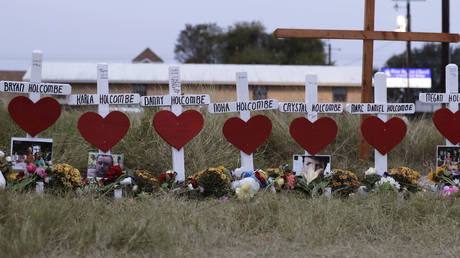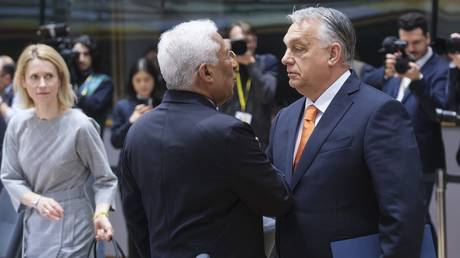
Judge accused the US government of trying to eschew responsibility for a mass shooting in a church perpetrated by an ex-airman
A judge has ordered the US military to hand over more than $230 million to survivors and family members of those killed in a 2017 mass shooting in Texas, in which a former Air Force member took the lives of 26 people. The incident became the deadliest mass shooting in the state’s history.
In a Monday ruling, US District Judge Xavier Rodriguez said the government must pay out the sum over its failure to report prior domestic violence charges for ex-airman Devin Patrick Kelley, adding that this allowed him to go on to purchase firearms and commit the lethal shooting spree in the First Baptist Church of Sutherland Springs in November 2017 without tipping off a violent offenders database.
“The losses and pain these families have experienced is immeasurable,” Rodriguez said in the decision, accusing the government of attempting to “obfuscate its responsibility.”
The same judge previously ruled in July that the Air Force was 60% responsible for the shooting and Kelley only 40%, arguing the service branch did not enter the man’s charge into the database, which is used for background checks for firearms buyers and could have prevented him from obtaining a weapon.
Military records show Kelley was court-martialed for domestic violence – including striking and choking his wife, as well as abusing his step-son using “force likely to produce death or grievous bodily harm”– to which he pleaded guilty in 2012. He was later admitted to a mental health facility in New Mexico and briefly escaped before he was finally convicted and sentenced, ultimately being discharged from the military in 2014.
Kelley killed 26 people and injured another 22 in the shooting, which erupted during a Sunday church service in a town outside San Antonio, Texas. Following a police chase, he later took his own life.
A 2018 Defense Department Inspector General’s report concluded that the Air Force missed no less than six separate opportunities to alert authorities to Kelley’s history of violence, acknowledging that the military’s “failures had drastic consequences and should not have occurred.”




